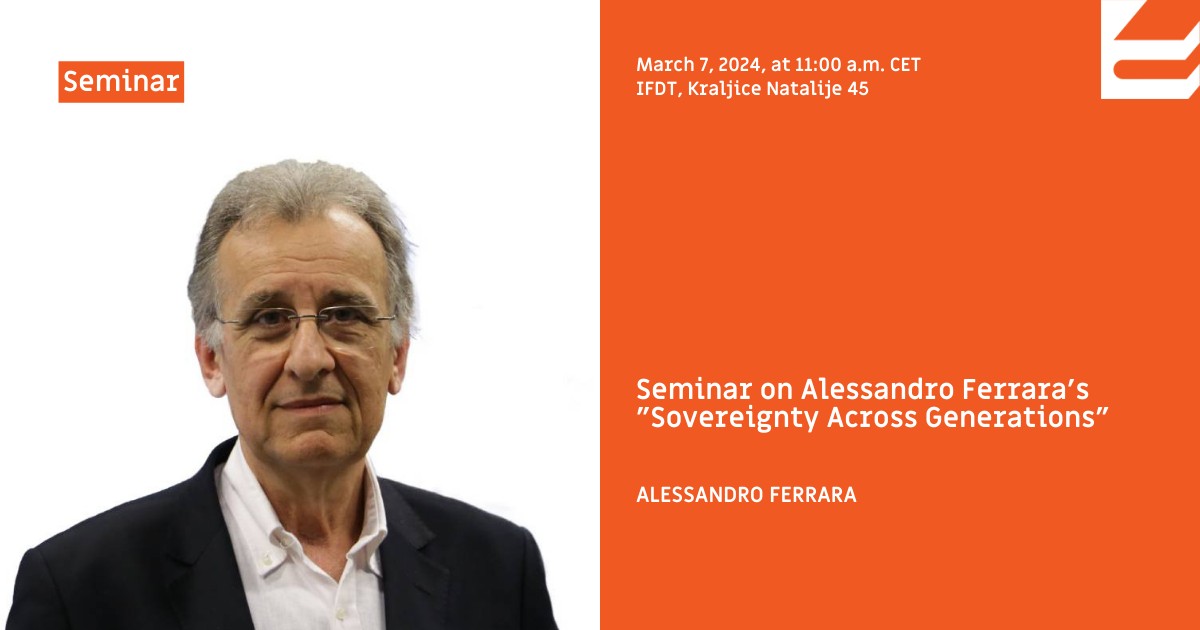
[BOOK SEMINAR] Seminar on Alessandro Ferrara’s “Sovereignty Across Generations” (CriticLab)
Under the sway of serial visions of democratic sovereignty, every cohort of voters may dream that its will is “the will of the people”; or it may understand itself, more modestly, as co-author of a constitutional project in a cross-generational sequence.
Steeped in the second perspective, Sovereignty Across Generations offers a theory of democratic sovereignty and constituent power inspired by political liberalism. Rawls’s leading question is ineludible for all critical theorists: “How is it possible for there to exist over time a just and stable society of free and equal citizens, who remain profoundly divided by reasonable religious,
philosophical, and moral doctrines?”. Today, from many fronts the idea is invoked of living in diversity without oppression, but no one explained in more detail than Rawls what this entails.
By updating and revisiting political liberalism, Alessandro Ferrara reconstructs Rawls's implicit view of constituent power beyond the few pages dedicated to it in Political Liberalism, brings that view into a new dialogue with Kelsen and Schmitt, spells out the limits of the power to
create and to amend the constitution and traces the deep sources of contemporary populism.
Alessandro Ferrara is Professor of Political Philosophy at the University of Rome Tor Vergata and teaches Legal Theory at Luiss Guido Carli University in Rome. He is former President of the Italian Association for Political Philosophy, and since 1991 he has been a Director of the Annual Conference on Philosophy and Social Science in Prague (formerly held at the Inter-University Centre of Dubrovnik). Since 2007 Ferrara has been on the Executive Committee of the Istanbul Seminars on Religion and Politics, held under the auspices of the Association Reset – Dialogues of Civilizations. He has also served as editorial consultant on the board of a number of journals including Constellations, Philosophy and Social Criticism, Krisis, Iris and The European Journal of Philosophy. He received his Ph.D. from the University of California, Berkeley in 1984, and conducted research with Jürgen Habermas as a Humboldt Fellow in Munich and Frankfurt. He has lectured in numerous universities and institutions, including Harvard University, Columbia University, Yale University, New School for Social Research, University College London, Oxford University, the Chinese Academy of Social Science and many others.
Ferrara’s work revolves around an account of normativity centered on authenticity and exemplarity, which incorporates a reconstructed version of Kant's "reflective judgment" and is intended as an alternative both to proceduralist, neo-transcendental approaches to validity and to anti-normative, radical contextualism. He is the author of, among other, Modernity and Authenticity. A Study of the Social and Ethical Thought of Jean-Jacques Rousseau (1993); Reflective Authenticity. Rethinking the Project of Modernity (1998); The Force of the Example. Explorations in the Paradigm of Judgment (2008); The Democratic Horizon. Hyperpluralism and the Renewal of Political Liberalism (2014); with Frank Michelman Legitimation by Constitution. A Dialogue on Political Liberalism (2021); and Sovereignty Across Generations. Constituent Power and Political Liberalism (2023).
